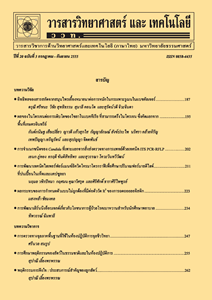ความรู้และทัศนคติที่ส่งผลต่อพฤติกรรมการลดขยะชุมชนแม่กา อำเภอเมือง จังหวัดพะเยา
Main Article Content
Abstract
บทคัดย่อ
ขยะเป็นปัญหาสุขาภิบาลและสิ่งแวดล้อมหลักของทุกชุมชน วัตถุประสงค์ในการศึกษาครั้งนี้ เพื่อศึกษาพฤติกรรมการลดขยะของชุมชนแม่กา อำเภอเมือง จังหวัดพะเยา ซึ่งเป็นชุมชนโดยรอบมหาวิทยาลัยพะเยา และศึกษาปัจจัยการลดขยะด้านลักษณะส่วนบุคคล ความรู้ และทัศนคติ โดยเก็บตัวอย่างจากกลุ่มตัวอย่าง 18 หมู่บ้าน จำนวน 486 คน วิเคราะห์โดย ค่าเฉลี่ย ส่วนเบี่ยงเบนมาตรฐาน F-Test และ Pearson’s correlation จากผลการวิจัยพบว่าระดับความรู้ของชุมชนในการลดขยะตามหลัก 5R ได้แก่ การลดการใช้ การใช้ซ้ำ การนำกลับมาใช้ใหม่ การซ่อมแซม การปฏิเสธไม่ใช้ อยู่ในระดับมาก มีทัศนคติและพฤติกรรมในการลดขยะในการซื้อสิ่งของตามความจำเป็น หลัก 5R และการจัดการขยะตามลำดับชั้นการจัดการขยะ อยู่ในระดับเห็นด้วยและระดับมาก ปัจจัยที่มีความแตกต่างและส่งผลต่อพฤติกรรมการลดขยะพบว่าลักษณะส่วนบุคคล ได้แก่ อายุ สื่อที่รับข่าวสาร ชนิดของขยะ การศึกษา สถานภาพ อาชีพ มีความแตกต่างอย่างมีนัยสำคัญ ความรู้เรื่อง ได้แก่ การลดการใช้ การใช้ซ้ำ การปฏิเสธไม่ใช้ การซ่อมแซม ลำดับชั้นการจัดการขยะ มีความแตกต่างอย่างมีนัยสำคัญ และทัศนคติไม่มีความแตกต่างกันอย่างมีนัยสำคัญต่อพฤติกรรมการลดขยะ ผลการศึกษาสหสัมพันธ์เพียร์สันกับพฤติกรรมการลดขยะ พบว่าพฤติกรรมการลดขยะมีสหสัมพันธ์เชิงบวกอย่างมีนัยสำคัญกับลักษณะส่วนตัว ได้แก่ การศึกษา อาชีพ รายได้ต่อเดือน สื่ออินเทอร์เน็ท และขยะเศษอาหาร ผัก ผลไม้ และกระดาษในครัวเรือน พฤติกรรมการลดขยะมีสหสัมพันธ์เชิงลบอย่างมีนัยสำคัญกับอายุ สถานภาพ สื่ออินเทอร์เน็ท และหนังสือพิมพ์ ขยะติดเชื้อและถ่านไฟฉายที่เกิดในครัวเรือน พฤติกรรมการลดขยะมีสหสัมพันธ์เชิงบวกอย่างมีนัยสำคัญกับความรู้เรื่องการลดการใช้ การซ่อมแซม และการปฏิเสธไม่ใช้ และมีสหสัมพันธ์เชิงลบอย่างมีนัยสำคัญกับความรู้เรื่องการลดขยะเรื่องการใช้ซ้ำ พฤติกรรมการลดขยะมีสหสัมพันธ์เชิงบวกอย่างมีนัยสำคัญกับทัศนคติ คือ การลดขยะจากครัวเรือน การลดการซื้อของที่ไม่จำเป็น การลดขยะตามหลัก 5R การลดการใช้ การใช้ซ้ำ การนำกลับมาใช้ใหม่ การซ่อมแซม และการปฏิเสธไม่ใช้ และพฤติกรรมการลดขยะไม่มีสหสัมพันธ์เชิงลบอย่างมีนัยสำคัญกับทัศนคติ
คำสำคัญ : การลดขยะ; ความรู้; ทัศนคติ; พฤติกรรม; ชุมชนแม่กา
Abstract
Solid waste is causes of sanitation and environmental problems of every community. The purposes of this research were to study waste reduction behavior of Maeka community, Muang district, Phayao province around University of Phayao and to study waste reduction factors including personal parameters, knowledge and attitude. Samples collected from 486 people at 18 villages. Data were analyzed statistics by using percentage, means, standard deviation, F-Test, and Pearson’s correlation. Results showed that the level of reducing waste knowledge by 5R principle as follow Reduce, Reuse, Recycle, Repair, and Reject had high level. Attitude and behavior of waste reduction about wise purchase, 5R principles, and waste management hierarchy had agree and high level. Factors differed and affected to decrease municipal waste consisting of age, mass communication, types of household waste, education, marital status, and occupation significantly. Knowledge about 5R principle and waste management hierarchy were significantly difference, but attitude was not difference significantly. Result of Pearson’s correlation found that reducing waste behavior had significantly positive correlation with education, occupation, income, internet, organic and paper waste; whereas age, marital status, internet and newspaper, infectious waste and battery had significantly negative correlation. Waste reduction practice had positive correlation significantly with knowledge of Reduce, Repair, and Reject, but they had significantly negative correlation with knowledge of Reduce and Reuse. Reducing waste behavior had positive significantly correlation with attitude of decrease household waste, wise purchase, 5R principle, whereas they had not negative correlation.
Keywords: reducing waste; knowledge; attitude; behavior; Maeka community


